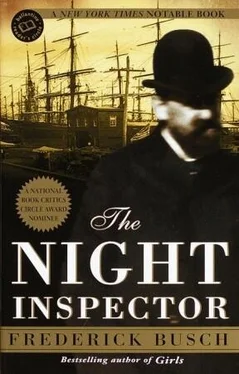While Sam visited the telegraph office to demonstrate to his editors in Boston that his story — of a great national treasure gone into neglect — would repay the cost of his sleeping and eating and drinking very well, I made for my office. I had no check from Lapham Dumont, but I did have a set of papers that would have made a national treasure, or even a journeyman, proud if his profession was the composition of fiction. For, according to these papers, a shipper in Corpus Christi had received a cargo of rum from Haiti; he had sent it from his warehouse on a schooner bound for the Port of New York, which had paused for replacement of its gaff sail boom at Savannah. It was due in tomorrow, three dozen tun and half-tun barrels of bonded spirits. A carter, led by Adam, would receive the shipment in the high light of noon — according to the papers — although Adam knew, and M knew, and Jessie knew, and Dumont did not, I prayed, that the wagons would be loaded and would roll — up Washington or Greenwich Street, some perhaps up Broadway — ponderous and piled, and alive with small black children who had hours before been scampering on the decks of Captain Corbeil’s ship. These papers did not represent the sums forwarded, and received, for the captain’s fee, and for two adult Negro women to supervise the conduct, and see to the comfort, of the children on their voyage from slavery to freedom. The amounts expended for food and drink and bribes for the skeleton crew were not listed. Nor were there details of how they had been freed; it was a shadow freedman’s bureau, Jessie implied, not trusting even me with names or locations, for the South was still a dangerous place. There was a bill of lading and a receipt of shipment. There were carter’s fees, marked as paid in full. And there were the warehouse receipts.
Missing was the Special License required for landing goods from on board a cargo vessel, as required in the statutes governing the tax Surveyor of the Port of New York; that license had to be provided to the night inspector by the Collector’s Office. I had written one out for M, and he was going to sign it. There was also missing a certificate of duties paid, a Customs House form, and M would also sign that. He would become, instead of the teller of truths, a liar on federal forms: a felon and a forger. This, I thought, is how fiction is constructed — of felonies and forgeries, of lies about hogsheads swung ashore, against the laws, at night.
What I did not yet know was whether M would sustain his enthusiasm. For he had said to me at last, “If we can save these children, we must.” He had faltered and gone silent, and I’d looked away. I heard the gurgle of spirits and then his voice again: “Law must be required to kneel before the right. That is what happened at times in the War.”
“This I do know,” I had told him.
“And it did not occur in my home.”
I knew that he was thinking of Malcolm, and that something to do with his household laws had been obliquely touched upon. I could not see it. I could feel it, though.
“We must see to what is right. There is risk — an income, a pension, the frayed remnants of a reputation.”
“Life,” I had told him, “and limb.”
His breath met the level of the liquor in his glass. I heard his breathing fill up the glass. “They are as nothing, or at any rate little. A man falls from the yardarm and crushes his skull and dies. He is sewn into a shroud of sailcloth loaded with scraps of ballast or balls of shot, and he is slid from under a flag off the deck to lie on the floor of the sea forever and ever. That he broke, and how, are of small moment. They are life and limb. But was he, at a moment of his life, in the right? I will sign the forms, Billy. We will off-load in darkness. The children shall be free. And then may heaven protect them.”
It was all too much of principle for me, and overmuch protestation. I must see him sign before I might speculate on right, wrong, sailcloth shrouds, or freedom. What I engaged in were transactions. The rest of it, I thought, were words — some of them, I had to allow, said by Jessie.
There were other documents to read and sign, and a check to write, and one to bank, and a proposal from a speculator in real estate sold or leased for theatrical purposes; he had become one of the underwriters, and he urged me to purchase a share of his share, of appearances in New York by Mr. Charles Dickens, who, in January, would give what the notice said were readings. That is to say, the English writer would appear in the Steinway Hall, which was built to hold an audience of over two thousand, and he would dramatize scenes, as I understood it, from his many popular books. Sam had spoken of Dickens, and he was the sort of fellow who might buy several tickets. There might be many such, according to the esteem in which Dickens seemed to be held. It seemed to me an endeavor in which I might participate, and I knew that Sam would be charmed; perhaps he would return to New York for the readings, although, according to the proposal, Dickens would also appear in Boston. But it might be a jolly occasion, I heard myself saying to Sam, and it was, after all, the season that men alone, in large cities and, I speculated, on frozen prairies and ships at sea, might find most trying. Sam, I heard myself suggest, come down to New York for a holiday! I wrote a counterproposal and pinned to it a check, the transmission of which, with other innocent documents, I would see to later in the day.
I read in the Times of streets torn up for replacement of the surface with stone blocks instead of cobbles. Crack a cobble, I thought, and it’s one small, broken stone; crack a large stone block, and you’ve holes, soon enough, that you might lose a wagon in. And they called this progress. I thought of the laborers who would do the work, the Bohemians and Scandinavians, the sturdy Irishmen, the slender, powerful Chinese — if the Europeans permitted them to join the crews. And of course I thought of the woman who was married to a dead man. I thought of Jessie, tracing my fingers on the tattooed figures on her stomach and her breasts. I thought, in turn, of the dead horse in the road, and of the unnamed, squarish woman, so generous and weary, who had nursed me through considerable pain and shame and my wish to surrender, and who had goaded me to want to see again, and to dare being seen. The papers would be signed by the night inspector, and the unseen children would be taken uptown to an address that Jessie would provide. At the end of it, I would have served her, and Adam would have served his people and me, and M would have served Malcolm or, anyway, his memory of him, and Sam would not have served; he would have observed, which seemed to constitute his passion.
And where, then, I wondered, would each of us go? For this would have been a small event of such large moment in our lives, that a change or shift or long pause for reflection would feel necessary, I thought. And I wished I knew what I hoped for from Jessie. My work toward the end she sought was, after all, a transaction. Would one between us then begin? Or would it have concluded? I had been in the company of Sam, with his speculations and his formulations, for too long, I thought. It had not occurred to me, during our time in the War, that he might exert such an influence upon my life.
Had I seen this madness of the notebook during our fighting days? I wondered. And I could not recall. In fact, I thought, I had hardly noticed him, except as an extension of Sergeant Grafton and Private Burton and their mission as a group in detachment: to care for me. Burton had curried my horse and seen to his hooves and his tack. Sam had fed me when they cooked and while Burton fed the horses; the sergeant had seen to my few wounds and occasional sprains of the knee or shoulder, had waited out with me my sometime deafness after shooting, had gone over with me maps and escape routes, had established paroles and set out Sam and Burton as pickets while I was off on the hunt. I recalled Sam’s curious, wide eyes, his wiry hair, his sallowness and attentiveness and, in general, his seriousness, often leavened with humor; I suspected that some of the seriousness could be laid to fear, and it was a condition general to the four of us. We were alone, in Rebel country, and always about to come under their fire.
Читать дальше












